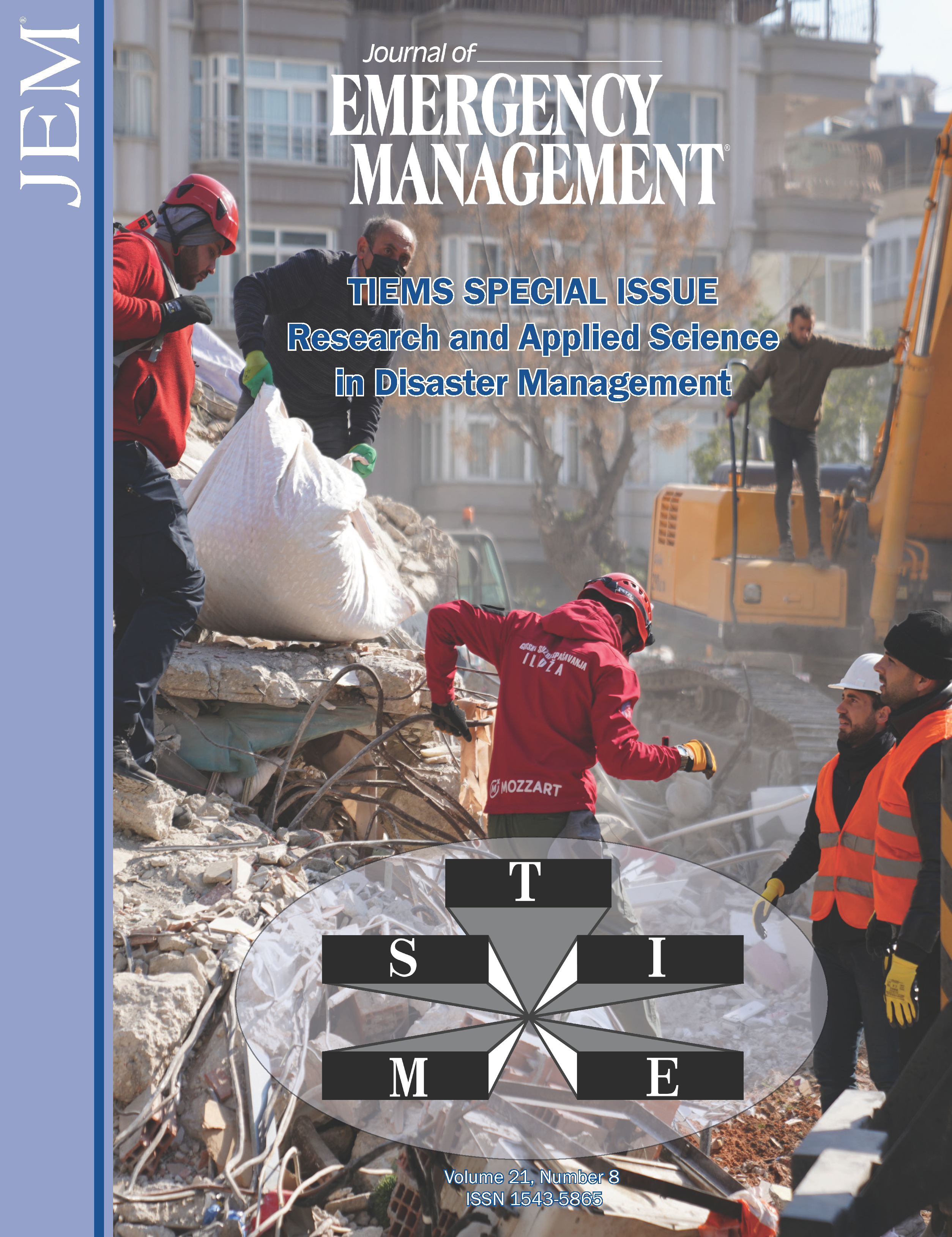Use of low-cost online tools to estimate the public’s interest in the changing conditions of their existence under the conditions during COVID-19, as a model for the emergency information assessment
DOI:
https://doi.org/10.5055/jem.0804Keywords:
disaster, COVID-19, South Africa, emergency managementAbstract
Online tools such as Google Trends and search volume trackers provide potential low-cost methods to evaluate the interest of the public in the current topics once a disaster strikes. A low-cost plugin is available commercially to extract the public interest data from Google and it is tested in this letter to the editor. The plugin was used to assess the time trends in the South African public's interest in working from home which became a relevant topic during the COVID-19 lockdowns. Results of the data extraction and analysis are presented and potential applications in emergency management are proposed.
References
Tandlich R: Resilience and the comprehension of the COVID-19 space-time: some thoughts on the potential impacts on ethics of education. (chapter 1.4). In: Management competencies and resilience in education. 2022, monograph from the project no. IGA 007VŠDTI/2020, DTI University, Dubnica nad Váhom, Slovakia.
Watson A, Lupton D, Michael M: The COVID digital home assemblage: Transforming the home into a work space during the crisis. Convergence. 2021; 27(5): 1207-1221. DOI: 10.1177/13548565211030848.
Leroy S, Schmidt AM, Madjar N: Working from home during COVID-19: A study of the interruption landscape. J Applied Psych. 2021; 106(10): 1448-1465. DOI: 10.1037/apl0000972.
Hollnagel E: The Changing Nature Of Risks. Ergonomics Australia J. 2008; 22(1-2): 33-46. Available at: https://hal-minesparistech.archives-ouvertes.fr/hal-00508858/document. Accessed February 28 2022.
Bezak E, Carson-Chahhoud KV, Marcu LG, et al.: The Biggest Challenges Resulting from the COVID-19 Pandemic on Gender-Related Work from Home in Biomedical Fields-World-Wide Qualitative Survey Analysis. Int J Environ Res Public Health. 2022; 19(5): Article number 3109. DOI: 10.3390/ijerph19053109.
Islam A: Work-from/at/for-home: COVID-19 and the future of work – A critical review. Geoforum. 2022; 128: 33-36. DOI: 10.1016/j.geoforum.2021.11.018.
Hussmanns R: Defining and measuring informal employment. Bureau of Statistics, International Labour Office, Geneva, Switzerland, 2007. Available at https://www.ilo.org/public/english/bureau/stat/download/papers/meas.pdf. Accessed August 27, 2022.
World Bank: Metadata Glossary: Informal employment, 2022. Available at https://databank.worldbank.org/metadataglossary/gender-statistics/series/SL.ISV.IFRM.FE.ZS. Accessed August 27, 2022.
Runciman C: Why formal employment is not a guaranteed path to social equality. 2022. Available at https://theconversation.com/why-formal-employment-is-not-a-guaranteed-path-to-social-equality-177251. Accessed August 27, 2022.
Allen SF, Stevenson J, Lazuras L, et al.: The role of the COVID-19 pandemic in altered psychological well-being, mental health and sleep: An online cross-sectional study. Psych Health Med. 2022; 27(2): 343-351. DOI: 10.1080/13548506.2021.1916963.
International Labour Organisation/Organisation for Economic Development and Cooperation (ILO/OECD): The impact of the COVID-19 pandemic on jobs and incomes in G20 economies, 2020. Available at https://www.ilo.org/wcmsp5/groups/public/---dgreports/---cabinet/documents/publication/wcms_756331.pdf. Accessed August 21, 2022.
Lentoor AG, Maepa MP: Psychosocial Aspects During the First Wave of COVID-19 Infection in South Africa. Frontiers in Psychiatry. 2021; 12. DOI: 10.3389/fpsyt.2021.663758. Available at https://www.frontiersin.org/article/10.3389/fpsyt.2021.663758.
Iheanetu CU, Tandlich R: Between science, science-fiction and COVID-19 as a way to interpret the ontological realm of COVID-19. Humanity in the post-COVID-19 and re-application of knowledge. Academicus Intern Sci J. 2022; 26(26): 27-46. DOI: 10.7336/academicus.2022.26.02.
Coulombe S, Pacheco T, Cox E, et al.: Risk and Resilience Factors During the COVID-19 Pandemic: A Snapshot of the Experiences of Canadian Workers Early on in the Crisis. Frontiers in Psychology. December 3, 2020; 11, DOI: 10.3389/fpsyg.2020.580702.
Reid C, Brindley P, Hicks C, et al.: Zero point survey:Aa multidisciplinary idea to STEP UP resuscitation effectiveness. Clin Experi Emer Med. 2018; 5(3): 139-143. DOI: 10.15441/ceem.17.269.
Burivalová Z, Butler RA, Wilcove DS: Analyzing Google search data to debunk myths about the public's interest in conservation. Frontiers Ecology Environ. 2018; 16(9): 509-514. DOI: 10.1002/fee.1962.
Hammer O, Harper DAT, Ryan PD: PAST: Paleontological Statistics Software Package for Education and Data Analysis. Palaeontologia Electronica. 2001; 4(1): 1-9. Available at https://www.researchgate.net/publication/259640226_PAST_Paleontological_Statistics_Software_Package_for_Education_and_Data_Analysis. Accessed October 30th, 2022.
Downloads
Published
How to Cite
Issue
Section
License
Copyright 2007-2025, Weston Medical Publishing, LLC and Journal of Emergency Management. All Rights Reserved.
Leave Nobody Behind: Emergency Management in a More Inclusive Way is a trademark of Journal of Emergency Management






